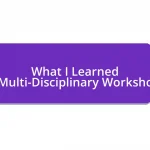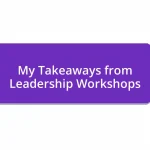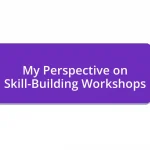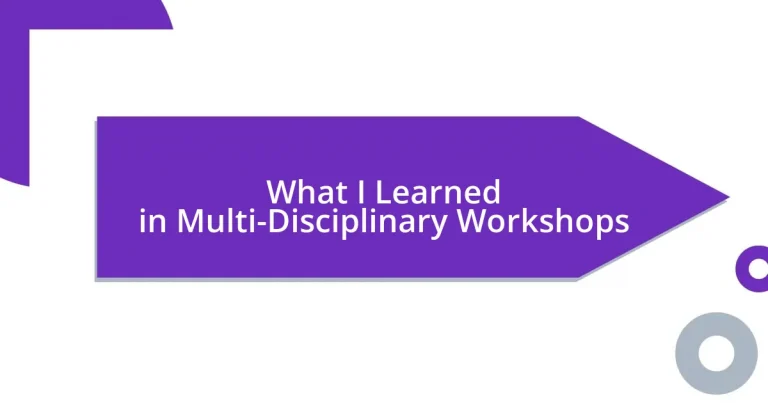Key takeaways:
- Multi-disciplinary workshops enhance creativity and foster innovation through diverse perspectives and collaborative learning.
- Effective communication and establishing clear roles within teams are vital for overcoming challenges in multi-disciplinary settings.
- Implementing workshop learnings in real-world projects can lead to transformational changes and improved team dynamics.
- Continuing personal growth involves self-reflection, seeking feedback, and mentoring others to reinforce and apply learned skills.
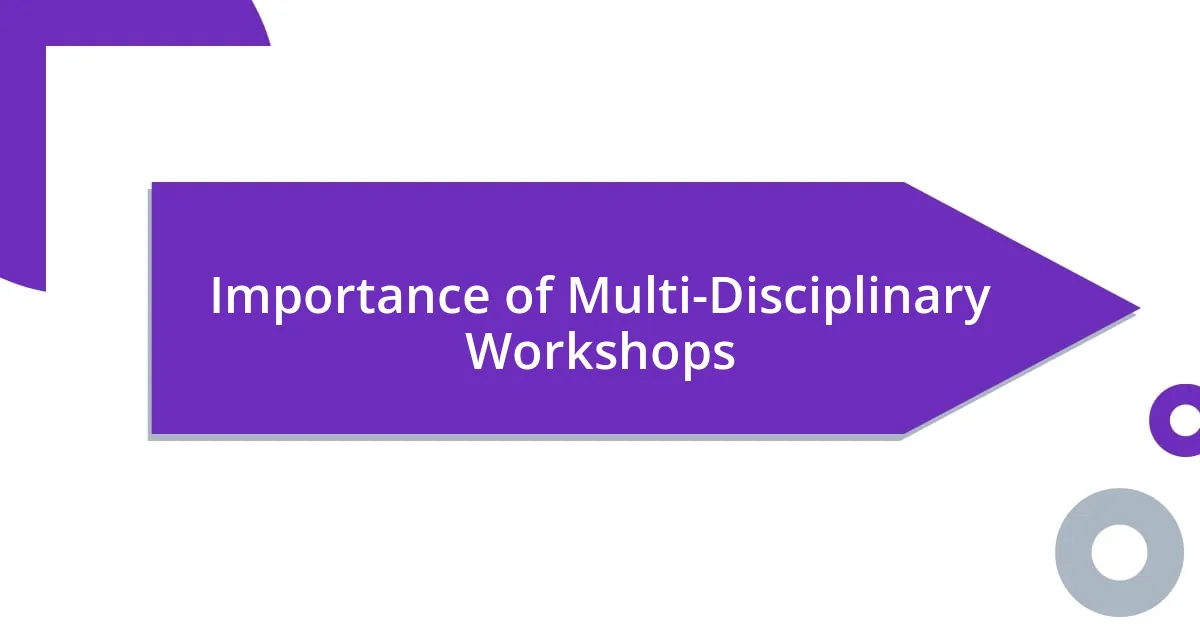
Importance of Multi-Disciplinary Workshops
Multi-disciplinary workshops are crucial because they break down silos and encourage collaboration. I remember attending one such workshop where individuals from diverse backgrounds shared unique perspectives. It was eye-opening—why do we often limit ourselves to our own fields when the best solutions often lie outside our immediate expertise?
Participating in these workshops not only fuels creativity but also fosters innovation. I once worked with engineers, artists, and educators on a project. The cross-pollination of ideas was exhilarating! It made me realize how often we struggle to think outside the box—what if we embraced these differences more regularly?
Moreover, multi-disciplinary workshops create a supportive learning environment. I cherish the friendships and networks I’ve built in these settings; they have enriched my professional journey profoundly. Isn’t it fascinating how connecting with others who think differently can lead to personal growth in ways we never anticipated?
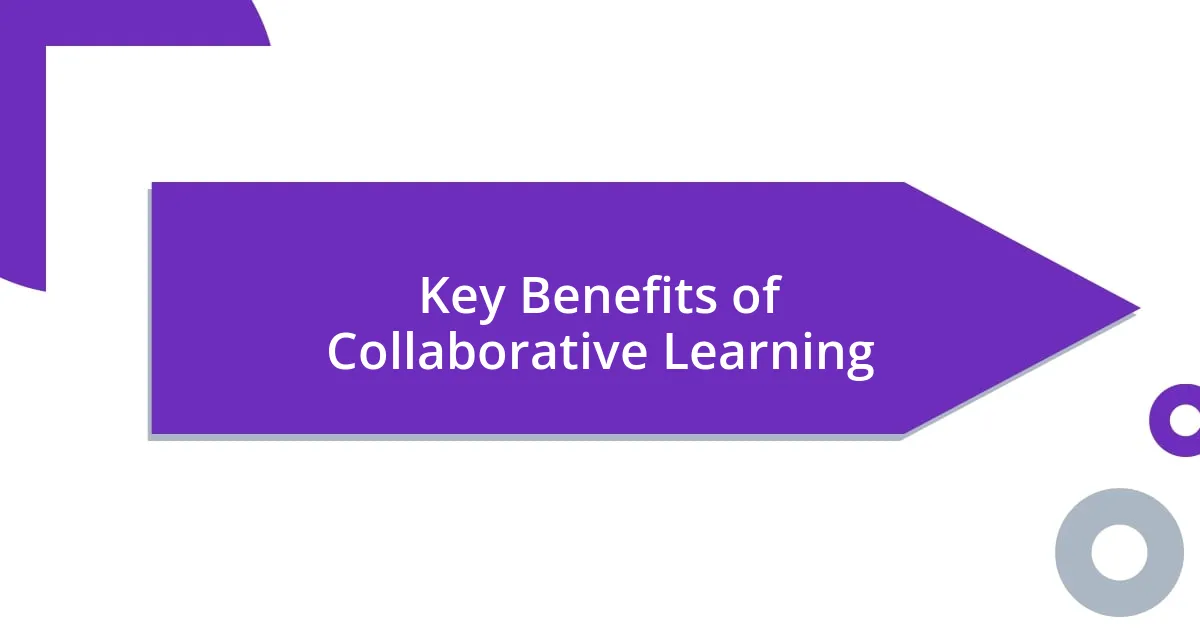
Key Benefits of Collaborative Learning
Collaborative learning opens up a world of shared knowledge. I remember a workshop where we tackled a real-world problem together. The energy in the room was palpable! Everyone’s unique contributions were like puzzle pieces coming together to form a complete picture. This synergy not only boosts understanding but also enhances our ability to approach challenges from various angles.
One of the most profound benefits I’ve experienced is the development of critical thinking skills. During a session focused on design thinking, my group dissected various scenarios drawn from our individual fields. I was amazed at how quickly we adapted each suggested idea into something more robust, showing that dialogue amongst diverse minds is a breeding ground for innovation. Have you ever tried brainstorming with people from different backgrounds? The sparks of creativity can be truly transformative!
Moreover, the relationships formed in collaborative settings often extend beyond the workshop itself. I once met a tech developer in a workshop who later became a mentor in my professional journey. The connections we create are invaluable; they lead to unexpected opportunities and partnerships. Isn’t it wonderful how these shared experiences bind us together and facilitate our growth in uncharted territories?
| Key Benefits | Examples from Experience |
|---|---|
| Enhanced Creativity | Workshops leading to innovative solutions |
| Critical Thinking | Design thinking sessions fostering adaptable ideas |
| Networking Opportunities | Connections transforming into mentorships |
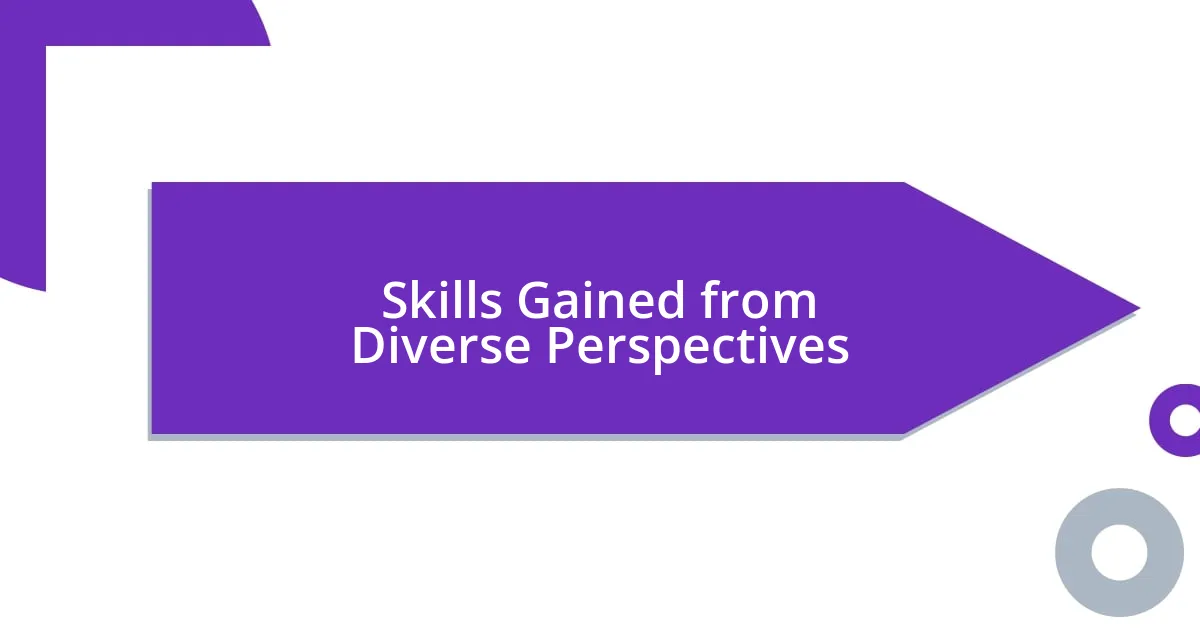
Skills Gained from Diverse Perspectives
Engaging with individuals from various disciplines has taught me the value of adaptability. In one workshop, I teamed up with a biologist and a marketer to develop a campaign for a sustainability initiative. The experience was a humbling reminder that my perspective, rooted in design, was just one lens through which to understand our audience. I felt a sense of excitement as we navigated our differing viewpoints, ultimately crafting a compelling message that resonated with a wider community. This collaboration not only sharpened my communication skills but also deepened my appreciation for the diverse narratives that shape our world.
The skills gained from these rich interactions extend far beyond the workshops themselves. Here’s a look at some of the core competencies I’ve developed along the way:
- Enhanced Empathy: I’ve learned to view challenges through others’ eyes, making my approach more inclusive.
- Flexible Problem-Solving: Diverse thought processes teach me to pivot ideas quickly, allowing for innovative, multifaceted solutions.
- Active Listening: Engaging with varied perspectives requires me to listen deeply, helping synthesize complex information into actionable insights.
- Broadened Mindset: Constant exposure to different fields encourages me to challenge my assumptions and embrace uncertainty.
These experiences create a fascinating tapestry of skills that continue to evolve as I collaborate with inspiring individuals.
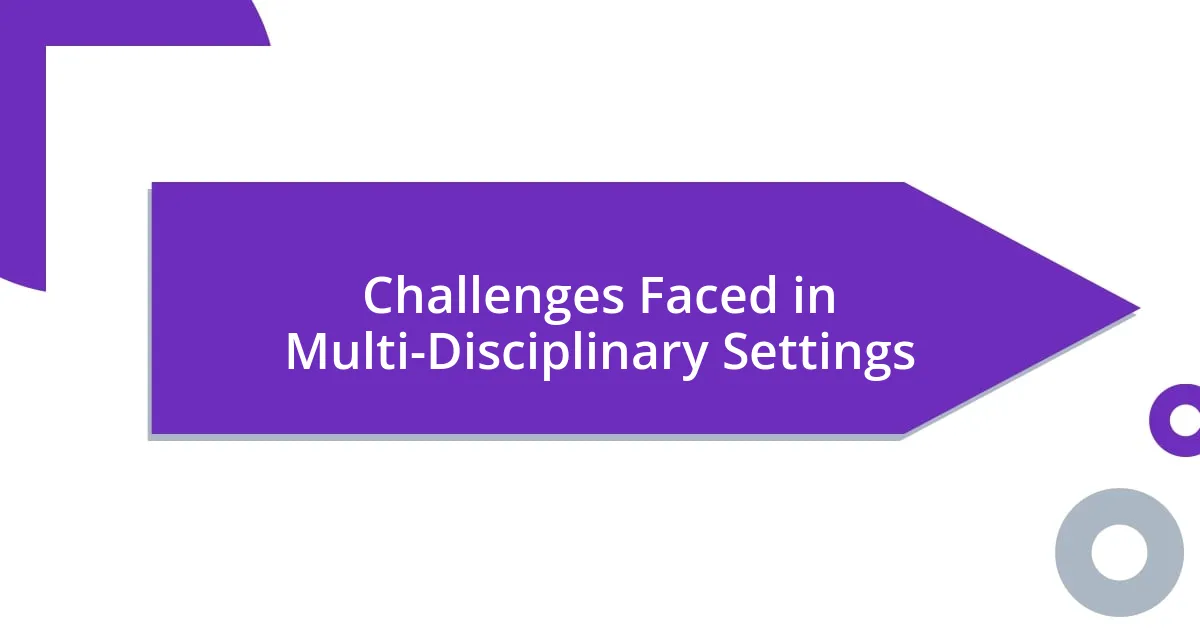
Challenges Faced in Multi-Disciplinary Settings
In multi-disciplinary settings, navigating differing communication styles can be a significant challenge. I recall a workshop where the technical jargon of one participant created confusion for others, making it difficult to find common ground. Have you ever felt lost in a conversation filled with terms you didn’t quite understand? It’s a reminder that effective collaboration hinges on clarity and the ability to translate complex ideas into accessible language.
Different priorities and perspectives often lead to misunderstandings as well. During a project, I worked alongside an artist whose focus was very much on creativity, while I was grounded in practicality and deadlines. The tension was palpable and led to several frustrating moments for both of us. How do we bridge that gap? I found that open dialogue was key. By expressing our concerns and expectations, we discovered that blending creativity with practicality could be the innovative spark we needed.
Another hurdle is aligning objectives among diverse team members. In one session, our group’s aim seemed to shift almost every hour—some wanted to explore theoretical implications, while others were eager for actionable outcomes. It can lead to a sense of chaos, and I often wondered, how do we stay focused? I learned that establishing a shared vision at the outset creates a foundation to navigate those shifting goals. It was eye-opening to see how a simple alignment exercise transformed our teamwork dynamic, ultimately leading us toward a cohesive solution.
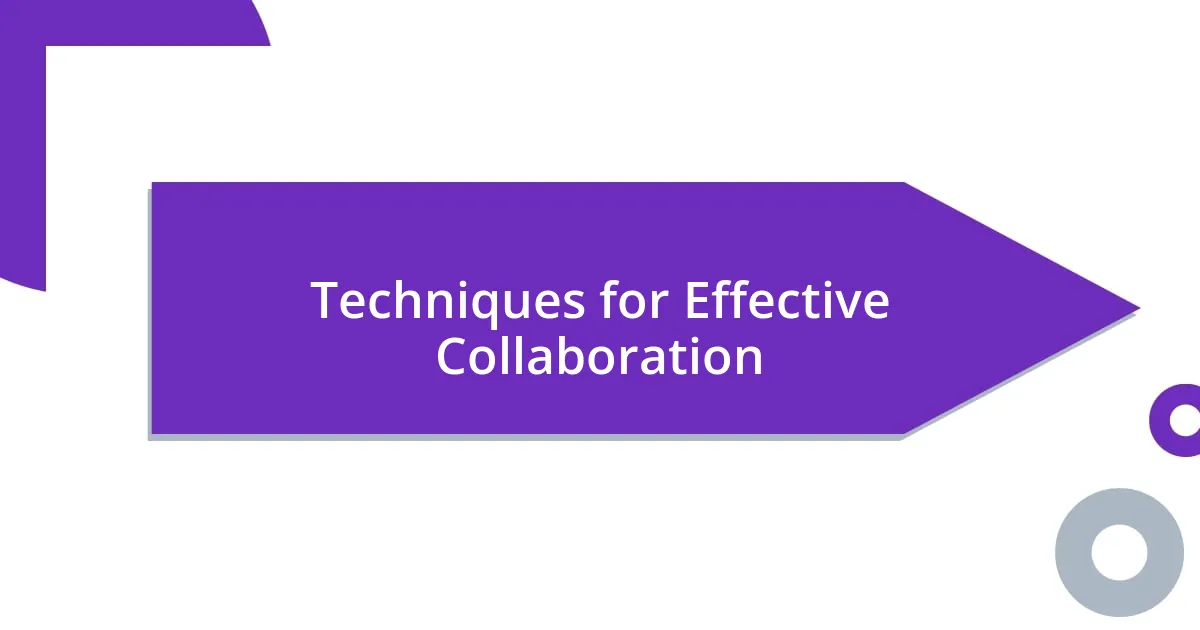
Techniques for Effective Collaboration
When working collaboratively, one technique that has proven invaluable to me is the practice of establishing clear roles within the team. In a recent workshop, I was part of a group tasked with developing a community health awareness campaign. By defining each member’s strengths and responsibilities from the start, we minimized confusion and maximized our efficiency. It felt empowering to know exactly where I could contribute the most, and it also fostered a sense of ownership across the team.
Another approach I found personally effective is the use of brainstorming sessions that prioritize inclusivity. I remember facilitating a group discussion where we employed a “round-robin” technique, allowing everyone to share ideas one at a time. This method not only prevented certain voices from dominating the conversation but also created an environment where everyone could feel safe to express their thoughts. Have you ever been in a meeting where one or two people take over the conversation? By giving everyone an equal opportunity, I noticed the energy in the room shifted—it felt like we were truly collaborating rather than just sharing opinions.
Finally, I can’t stress enough the importance of feedback loops. In a project focused on environmental design, we regularly checked in with one another, openly discussing what was working and what needed adjustment. At first, this candidness felt a bit daunting; after all, who enjoys criticism? However, embracing this feedback ultimately enhanced our project. It encouraged me to adapt quickly and stay aligned with the team. In my experience, creating a culture where feedback is welcomed and valued shifts the dynamic to one of continuous improvement and innovation.
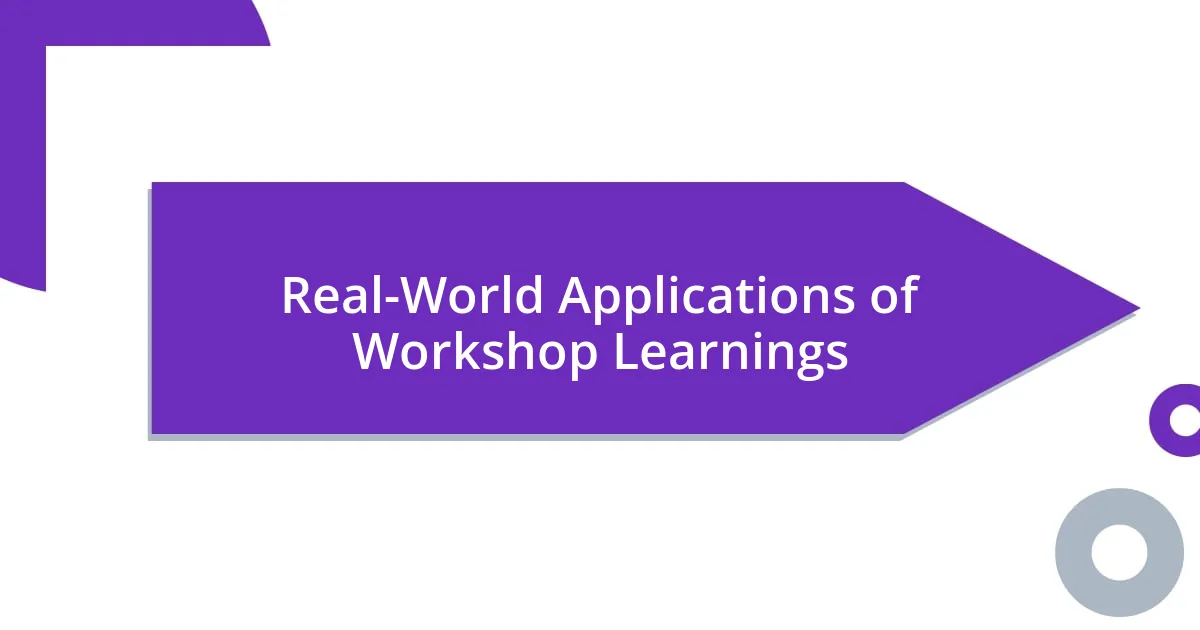
Real-World Applications of Workshop Learnings
In my experience, the real-world applications of learnings from multidisciplinary workshops can be profound. For instance, after participating in a workshop on design thinking, I applied that approach when my team was tasked with revamping our company’s onboarding process. I remember feeling an overwhelming sense of excitement as we shifted our focus from rigid structures to a more user-centered design. Have you ever seen the transformative power of empathy in action? The shift not only improved our training programs but also fostered a more engaged and connected team, which I’m sure we all crave in our workplaces.
I also had a chance to apply concepts from a conflict resolution workshop during a project that involved differing opinions on strategic direction. The techniques we learned about active listening and calm communication felt like a revelation on that occasion. As I took a deep breath and facilitated an open discussion, I witnessed tensions dissipate. There’s something empowering about creating a space where everyone feels heard, don’t you think? It led to a more collaborative spirit and, ultimately, a solution that everyone supported, which was a major win in my book.
Additionally, the focus on agile methodologies in a recent workshop has reshaped how I approach project management. I recall modifying my workflow, break it down into smaller tasks for quicker feedback and iterations. This method not only allowed for greater adaptability to changes but also kept the excitement alive as we celebrated small wins along the way. Isn’t it rewarding to see progress steadily rather than waiting for a big reveal? I found that allowing room for experimentation and adjustment cultivated a more dynamic and resilient team atmosphere.
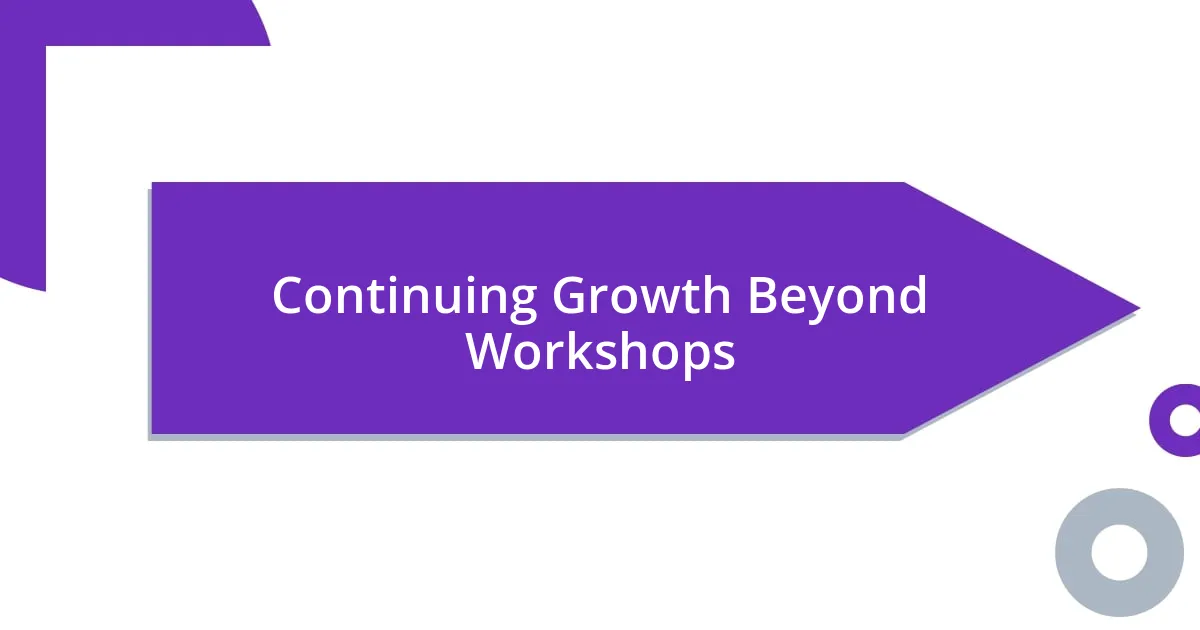
Continuing Growth Beyond Workshops
Continuing growth beyond workshops is all about taking those insights and experiences and weaving them into our everyday lives. After a recent workshop on teamwork strategies, I found myself reflecting on how easy it can be to slip back into old habits. One day, while working on a project proposal, I realized I hadn’t actively sought feedback from my colleagues like I had during the workshop. Instantly, I felt a twinge of disappointment. How do we hold ourselves accountable for implementing change? For me, creating reminders or check-ins with my peers has become essential.
I also discovered the importance of self-reflection after each workshop experience. For example, following a session focused on creative problem-solving, I spent time journaling about my feelings and thoughts on the strategies we discussed. Did I really grasp the concepts, or was I merely going through the motions? The process of documenting my insights helped cement new approaches in my mind. It’s fascinating to see how writing can clarify your intentions, right? I believe it allows us to surface our true thoughts and motivations, paving the way for genuine growth.
Finally, seeking opportunities to mentor others can significantly extend our learning. I once took on a role to guide a junior team member, and through that experience, I revisited many principles I had learned in workshops. Watching someone else apply those techniques made me realize that teaching can solidify your understanding. Have you ever experienced that aha moment while explaining a concept? The insights you gain while helping someone else can sometimes eclipse your original learnings, leading to deeper comprehension and continued growth beyond the workshop environment.
